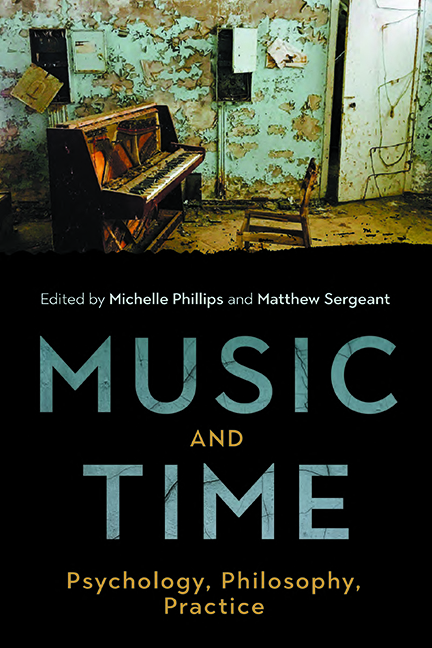2 - The Remembrance of Things to Be: An Approach to Memory, Repetition, and Cyclical Structures
Published online by Cambridge University Press: 07 October 2022
Summary
Introduction
The following chapter provides an overview of the function of time in the music I have written over the past decade or so. I use four sub-headings to structure the chapter in such a way that moves from an examination of time on a micro- to a macro-scale. In part 1, I outline the cyclical processes involved in putting these pieces together from the perspective of Jonathan D. Kramer's concept of a non-directed linear time (see also Redhead, Chapter 9, this volume) and make reference to Husserl's model of passive synthesis (see also Connor and Smith, Chapter 4, this volume). In part 2, I consider the use of recursivity and the role of musical memory, referring to Deleuze's notions of difference and repetition. In part 3, I open up a broader discussion of musical form, demonstrating how techniques employed at a local level impact upon the macrostructure of these works (see also Thomas, Chapter 6, this volume). In part 4, I discuss more recent developments in my thinking that have given rise to questions about how this sense of non-directed linear time might be disrupted or even momentarily suspended. Here, I consider liminality in relation to form and extended duration.
In this chapter, I will examine (i) how pitch intervals and time intervals are linked in my work, (ii) how I have used cyclical pitch structures to create or disrupt a sense of musical flow, and (iii) how I have used repetition to provide points of orientation and disorientation for the listener on both micro- and macro-levels. Issues of musical memory and how they relate to temporality become pertinent from the second section onwards. I draw upon Edmund Husserl, Maurice Merleau-Ponty, and Gilles Deleuze to illustrate the subjective aspect of time passing from a philosophical perspective. I also cite music psychologists and musicologists Diana Deutsch, Eric Clarke, and Bob Snyder, as well as music theorist David Clarke and anthropologist Tim Ingold as a means of supporting the perceptual outcomes identified above. My frames of reference are entirely personal; there are certain leanings here toward phenomenological perspectives similar to those outlined in Chapter 4 of this volume and particular choices of psychological models that parallel some of the types discussed in Chapters 1 and 3, but I am cautious of aligning myself too readily with any specific philosophical or psychological school of thought.
- Type
- Chapter
- Information
- Music and TimePsychology, Philosophy, Practice, pp. 29 - 41Publisher: Boydell & BrewerPrint publication year: 2022



